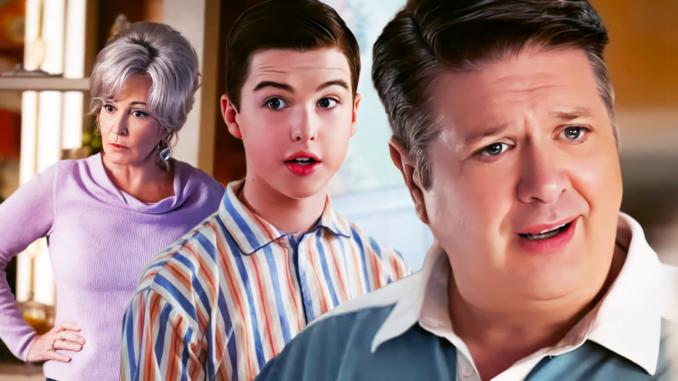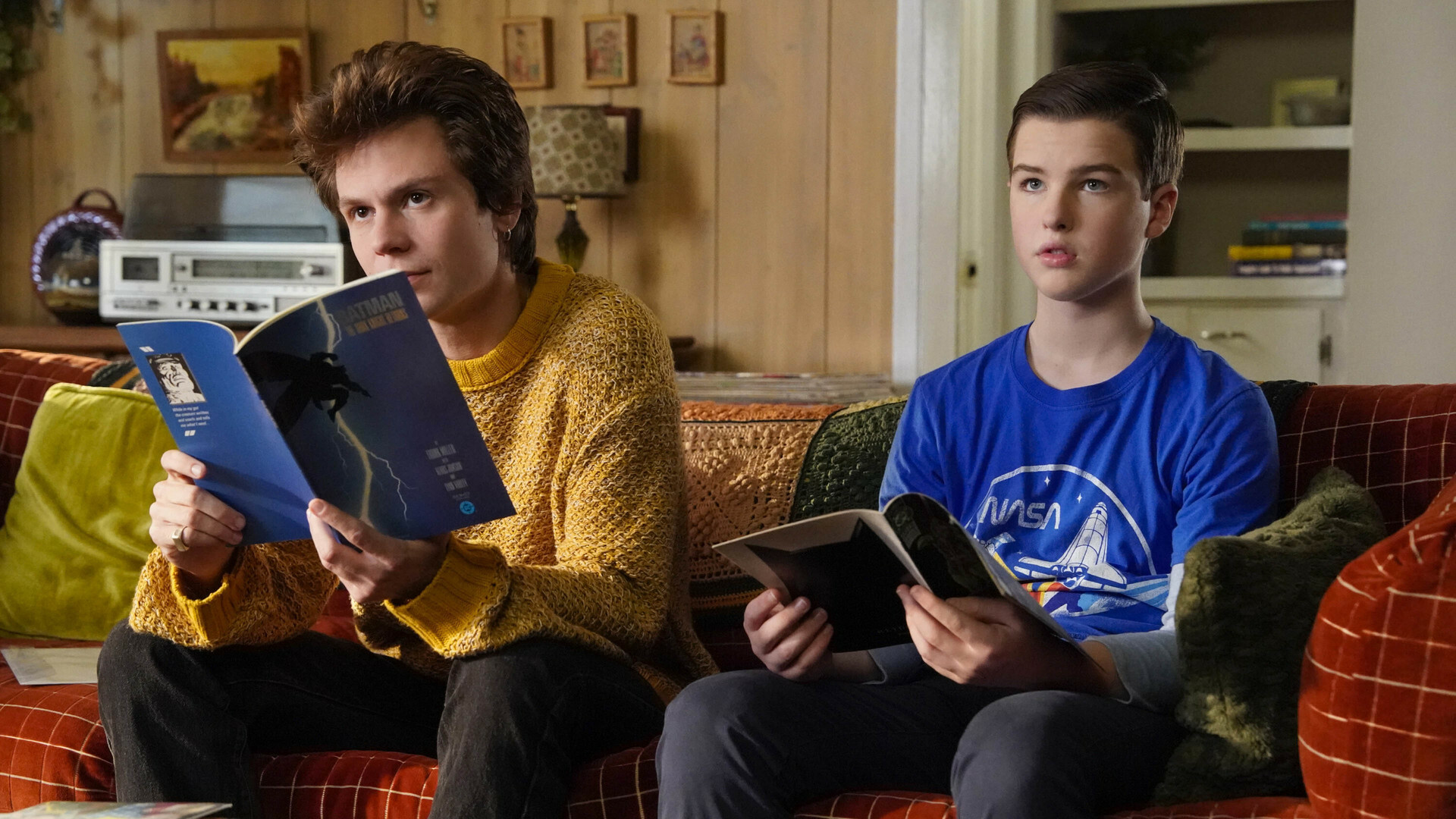
Season 6 of Young Sheldon is the most emotionally charged, narratively complex, and bittersweet installment of the series so far. It serves as a bridge between the relatively light-hearted tone of earlier seasons and the emotional climax we know is coming from The Big Bang Theory‘s timeline.
This season dives deeper into themes of family breakdown, unexpected responsibility, and emotional isolation. With Sheldon preparing for a future beyond Texas, Georgie facing adulthood head-on, Missy rebelling against the norm, and George and Mary’s marriage under intense pressure, the Cooper family begins to fracture in painful, poignant ways.
While Season 6 retains moments of warmth and humor, its core is about loss — not just death, but the slow, subtle loss of childhood, innocence, and family unity.
Sheldon’s Science Dreams Expand — And So Does His World
For Sheldon, Season 6 is about vision and ambition. He’s obsessed with building a database for scientific research that could revolutionize how scientists collaborate — an idea clearly foreshadowing his eventual Nobel Prize in The Big Bang Theory. His academic work reaches new levels of sophistication, and he begins taking college more seriously than ever.
Sheldon also starts to expand his social and academic circle, especially through his interactions with Dr. Sturgis and Dr. Linkletter, as well as a new character: President Hagemeyer, the college president who tries (and often fails) to manage Sheldon’s relentless ideas.
However, Sheldon’s growing success brings with it an emotional toll. As he becomes more entrenched in his academic pursuits, he grows distant from his family — something he doesn’t fully realize but that others feel deeply. His discomfort with intimacy and inability to process emotions becomes more apparent, particularly during key family conflicts.
In a moving moment later in the season, Sheldon acknowledges that he doesn’t “understand people,” but wants to — a small but powerful sign of personal growth.
George Sr. and Mary: A Marriage at the Edge
The tension between George and Mary finally reaches a boiling point in Season 6. The season opens with their marriage already on fragile footing. Mary has been excommunicated from the church after supporting Georgie’s decision to keep the baby, and her spiritual crisis adds even more pressure to the household.
George, feeling alienated and undervalued, begins to withdraw emotionally. There’s an unspoken distance between them — quiet dinners, unanswered questions, and long silences. They try to reconnect, but years of miscommunication, sacrifice, and resentment can’t be undone easily.

Fans of The Big Bang Theory are painfully aware of George Sr.’s eventual death, and Season 6 starts to plant heavy emotional seeds. He becomes more introspective, sometimes looking lost in thought or out of place in his own home. His chest pains return, though he hides them. There’s no dramatic foreshadowing, just a slow emotional unraveling that makes it all the more poignant.
Georgie and Mandy: Parenthood at 17
Georgie’s storyline in Season 6 is perhaps the most powerful of the series so far. His girlfriend Mandy gives birth to their daughter, Cece, and Georgie is suddenly thrust into fatherhood. At just 17 years old, he’s forced to make decisions that most adults struggle with — from working full-time to navigating co-parenting with someone still unsure about being in a relationship.
Mandy initially resists Georgie’s efforts to be involved. She doesn’t trust him to be mature enough, and Georgie’s early attempts to help are clumsy and frustrating. But over time, Georgie proves his commitment, not with grand gestures, but with consistency: changing diapers, picking up groceries, staying up through sleepless nights.
What’s truly moving is how Georgie begins to transform from a joke character into a responsible, loving father. His journey is emotional and authentic, showing how pressure can forge maturity — and how even the most unlikely people can rise to the occasion when it matters.
By the end of the season, Georgie and Mandy begin to rediscover something deeper than romance: partnership.
Missy Breaks the Mold
While Sheldon is ascending academically and Georgie is adjusting to fatherhood, Missy is unraveling. Feeling ignored, overlooked, and emotionally abandoned, she begins acting out in increasingly risky ways: sneaking out, shoplifting, lying to her parents, and even vandalizing school property.
Missy’s rebellion is not just teenage angst — it’s a desperate cry for attention and control in a family that seems to revolve around Sheldon’s genius and Georgie’s crisis. She’s struggling to find her place in a household where she’s expected to be “the good one,” and the pressure becomes too much.
There’s a particularly moving episode where Missy confides in Meemaw, breaking down in tears and admitting that she doesn’t feel seen. It’s raw, honest, and beautifully performed.
Missy’s arc in Season 6 is about identity — not as Sheldon’s twin or the “normal” child, but as a person in her own right, craving acknowledgment and love.
Meemaw’s Unlikely Role as the Emotional Anchor
As the Cooper household spirals into stress and conflict, Meemaw becomes the unexpected emotional anchor. Her gambling room continues to be a quirky subplot, but more importantly, she becomes a bridge between generations.
She supports Mary after her fallout with the church, gives Georgie and Mandy space to live with her and raise their daughter, and even helps Missy navigate her emotional crisis. Meemaw’s home becomes a place of stability and comfort, a refuge from the emotional minefield of the Cooper house.
Her wisdom is rarely preachy. It comes in the form of tough love, sarcasm, and the occasional shot of whiskey — but her impact is clear.
Emotional Distance and the Breakdown of Communication
Season 6 masterfully shows how silence can be louder than shouting. Many of the Cooper family’s problems don’t explode — they simmer. Characters drift apart without meaning to. Dinners grow quieter. Conversations feel strained. There’s a heartbreaking realism to how the family begins to crumble — not from one event, but from a hundred little fractures.
This breakdown is especially visible in Mary and Sheldon’s relationship. Once his closest ally, Mary is now often too exhausted or distracted to engage with him fully. Sheldon doesn’t know how to express his needs without sounding cold or rude, and Mary no longer knows how to reach him. Their bond becomes transactional — meals, checklists, tasks — instead of emotional.
Foreshadowing the Future: The Thunderclouds Gather
By the final episodes of Season 6, the tension is nearly unbearable. George’s health is clearly in decline. Missy is increasingly isolated. Sheldon is preparing to attend a summer program in Germany, a massive step in his academic journey that symbolizes his emotional departure from the family.
The season ends with a storm — both literal and emotional — as a tornado rips through Medford, damaging Meemaw’s house and forcing everyone into survival mode. It’s a chilling metaphor for the chaos that’s about to descend on the Cooper family.
We know what’s coming in Season 7: George’s death. This season prepares us for it not with melodrama, but with quiet sadness. It’s the calm before the storm — or rather, the storm before the silence.
Season 6 of Young Sheldon is a masterclass in emotional storytelling. It takes risks, leans into its dramatic potential, and allows its characters to struggle, fail, and grow in organic, heartbreaking ways.
It’s no longer just a quirky comedy about a boy genius. It’s a profound look at family, adolescence, grief, and growing up. And as the final season looms, Season 6 ensures we’re not just watching a sitcom — we’re witnessing the end of an era.
